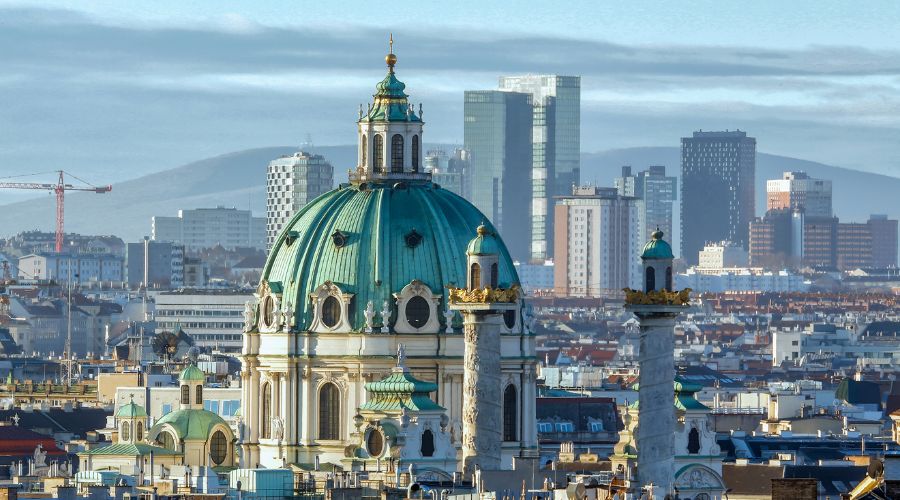10 Must-Visit Islamic Heritage Sites In Austria : Discover The Rich History And Culture
Austria, known for its breathtaking landscapes, classical music, and imperial history, also holds a rich, lesser-known Islamic heritage. Though Austria may not be widely recognized for its Muslim cultural influence, its Islamic heritage sites offer fascinating glimpses into the past. From majestic mosques to historical monuments, the Islamic presence in Austria dates back centuries. In this guide, we will explore 10 must-visit Islamic heritage sites that reveal the deep-rooted connection between Austria and the Islamic world.
1. The Mosque of Vienna (Mosque and Islamic Centre of Vienna)
Vienna, Austria's capital, is home to one of the most significant symbols of Islamic culture in the country—the Mosque and Islamic Centre of Vienna. Located in the 10th district, the mosque stands as a center for the Muslim community in Vienna and showcases beautiful Islamic architecture. The mosque, built in the 1970s, features intricate tile work and a grand prayer hall. Visitors can learn about the mosque's role in Austria's Islamic community and enjoy its serene ambiance.
2. The Blue Mosque (Vienna)
Another notable mosque in Vienna is the Blue Mosque (also known as the Muhammed Ali Mosque). Situated in the 21st district, it is one of the largest mosques in Austria. The mosque's design is a blend of traditional Ottoman and modern architectural styles. The Blue Mosque is named after the distinctive blue tiles that adorn its interior, and it offers a peaceful escape for both worshippers and visitors alike. It also provides educational programs for those wishing to learn more about Islam in Austria.
3. The Austrian Islamic Centre (Vienna)
The Austrian Islamic Centre is a prominent hub for Islamic culture in Vienna. Serving as both a mosque and cultural center, this institution works to promote better understanding between Austria's Muslim and non-Muslim communities. Its architecture blends Austrian and Islamic styles, symbolizing the fusion of cultures. The Centre is also home to various cultural events and educational programs, making it an essential stop for those interested in the intersection of Islam and Austrian society.
4. The Islamic Cemetery (Vienna)
The Islamic Cemetery in Vienna, located in the 10th district, is one of the oldest Islamic burial grounds in Austria. Established in the late 19th century, this cemetery is the resting place of many Muslim immigrants and prominent figures who helped shape the country's Islamic community. Walking through the cemetery, visitors can learn about the history of Islam in Austria and the contributions of the Muslim community to Austrian society.
5. The Moschee in Linz (Linz)
Linz, Austria's third-largest city, is home to the Moschee in Linz, one of the country's oldest mosques. Built in the 1990s, this mosque serves as both a place of worship and a cultural center for the Muslim community in the region. The mosque's beautiful architecture and serene surroundings make it a worthwhile visit. The mosque's community outreach programs offer insight into the diverse Muslim population of Linz.
6. The Suleymaniye Mosque (Innsbruck)
Innsbruck, located in the Tyrol region, is famous for its alpine scenery. But it is also home to the Suleymaniye Mosque, one of Austria's most picturesque mosques. Built in the Ottoman style, the mosque stands as a testament to the Ottoman Empire's influence on Austria. The mosque's beautiful dome and minaret make it a striking addition to the Innsbruck skyline. Visitors to Innsbruck can explore this mosque while enjoying the majestic mountains surrounding the city.
7. The Mimar Sinan Mosque (Vienna)
Named after the renowned Ottoman architect, Mimar Sinan Mosque in Vienna is another architectural gem. Located in the 5th district, this mosque features traditional Turkish design elements and serves as a gathering place for Vienna's Turkish Muslim community. The mosque is also a venue for cultural and interfaith dialogue, offering a welcoming space for people of all backgrounds to come together.
8. The Mosque of Graz (Graz)
Graz, the second-largest city in Austria, is home to the Mosque of Graz, an important religious and cultural site for the Muslim community in the region. Built in the 1970s, this mosque features a blend of modern and traditional Islamic architectural elements. The mosque's large prayer hall, serene atmosphere, and active community outreach programs make it a significant place for visitors interested in Islamic culture in Austria.
9. The Islamic Cultural Centre (Salzburg)
Salzburg, known for its musical history, is also home to the Islamic Cultural Centre. Although smaller than some of Austria's other Islamic sites, the centre plays an essential role in preserving and sharing Islamic heritage in Salzburg. The centre offers religious services, educational programs, and community events that promote Islamic culture and interfaith understanding.
10. The Ottoman Memorial in Vienna
While not a mosque, the Ottoman Memorial in Vienna stands as a symbolic monument to Austria's historical connections with the Ottoman Empire. Located in the heart of the city, the memorial commemorates the 1683 siege of Vienna and serves as a reminder of the deep historical ties between Austria and the Islamic world. The monument represents the complex relationship between Islam and Austria throughout the centuries.
Conclusion
Austria's Islamic heritage is often overlooked, but the country is home to several remarkable sites that highlight the significant role Islam has played in its cultural and historical landscape. From stunning mosques to historical landmarks, these 10 must-visit sites offer a unique opportunity to explore Austria's Islamic history and appreciate its rich cultural diversity. Whether you're a history enthusiast, a cultural explorer, or a traveler looking to learn more about Islam in Europe, Austria's Islamic heritage sites provide an unforgettable experience.
Tags :
